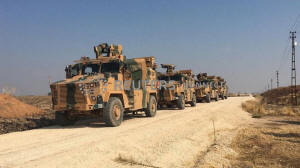Turkey, Russia begin joint patrols in northeast Syria
 Send a link to a friend
Send a link to a friend
 [November 01, 2019]
By Bulent Usta [November 01, 2019]
By Bulent Usta
SEVIMLI, Turkey (Reuters) - Turkish and
Russian troops began their first joint ground patrols in northeast Syria
on Friday under a deal between the two countries that forced a Kurdish
militia away from territory near Turkey's border.
Turkey and allied Syrian rebels launched a cross-border offensive on
Oct. 9 against the Kurdish YPG militia, seizing control of 120 km (75
miles) of land along the frontier.
Last week, Ankara and Moscow agreed to remove the militia fighters to a
depth of at least 30 km (19 miles) south of the border and Russia has
told Turkey that the YPG left the strip.
Turkish armored vehicles on Friday drove through country roads across
the border to join their Russian counterparts, according to Reuters
television footage filmed from the Turkish side of the border.
Ground and air units were involved in the patrol in the area of the
Syrian border town of Darbasiya, the Turkish Defence Ministry said on
Twitter, showing photos of soldiers studying a map and of four armored
vehicles.

The 110-km joint patrol with Russian military police, consisting of nine
military vehicles, was starting at Darbasiya and traveling west along
the border, the Russian Defence Ministry said.
Overnight, the Turkish Defence Ministry said Turkey had handed over to
the Russians 18 men, believed to be Syrian government soldiers, who were
detained in Syria near the Turkish border this week. It said the move
was coordinated with Russia but did not say who they were handed to.
The 18 men were seized on Tuesday during operations southeast of the
Syrian town of Ras al Ain, part of an area where Turkey's incursion took
place, stretching some 120 km (75 miles) along the border to the town of
Tel Abyad.
On Wednesday, President Tayyip Erdogan said Turkey had information that
the YPG, which Ankara sees as a terrorist group because of its ties to
Kurdish militants fighting an insurgency in southeast Turkey, had not
completed its pullout.
He said Turkey's joint patrols with Russia were starting on Friday at a
depth of 7 km (4 miles) within Syria, less than the 10 km set out in the
Oct. 22 Ankara-Moscow deal.
Russia is the Syrian government's most powerful ally and helped it turn
the tables in the country's civil war by retaking much of the country
from rebels since 2015. The Turkish-Russian deal last week allowed
Syrian government forces to move back into border regions from which
they had been absent for years.
Ankara launched its offensive against the YPG following President Donald
Trump's abrupt withdrawal of 1,000 U.S. troops from northern Syria in
early October. The YPG helped the United States smash the Islamic State
"caliphate" in Syria.
[to top of second column]
|

Turkish military vehicles are seen on the Turkish-Syrian border
before a joint Turkish-Russian patrol in northeast Syria, near the
Turkish town of Kiziltepe in Mardin province, Turkey, November 1,
2019. Turkish Defence Ministry/Handout via REUTERS

ERDOGAN'S PLANS
Erdogan said on Thursday night that Turkey planned to establish a
"refugee town or towns" in a "safe zone" between Tel Abyad and Ras
al Ain, part of a project which state media have said would cost 151
billion lira ($26 billion).
He was meeting U.N. Secretary-General Antonio Guterres on Friday
morning and said he would ask him to call for a donors' meeting to
help finance Ankara's plans for the resettlement of Syrian refugees
in the region.
"I will say: 'You make a call for an international donors' meeting.
If you don't, I will make this call'," Erdogan said in a conference
speech.
"If it doesn't happen, we will establish a refugee town or towns
between Tel Abyad and Ras al Ain," he said, addressing a building
contractor in the hall and saying he would ask him to play a role in
the project.
Ankara has said it plans to resettle in Syria up to 2 million of the
3.6 million Syrian war refugees that it hosts.
According to plans which Erdogan presented at the United Nations
General Assembly in September, Turkey would resettle some 405,000
people between Tel Abyad and Ras al Ain.
Erdogan said leaders at the General Assembly had looked positively
on the plans but declined to offer money. He strongly criticized
international reaction to the Syrian refugee issue.
"We have for years hosted millions of refugees in our lands. The
support we have received from the international community has
unfortunately just been advice," he said.
"The mentality that regards a drop of oil as more valuable than a
drop of blood does not see anything but its own interest in Syria
and everywhere in the world."

Last week Defense Secretary Mark Esper said the United States would
beef up its military presence in Syria with "mechanized forces" to
prevent Islamic State militants seizing oil fields and revenue.
(Additional reporting by Tuvan Gumrukcu in Ankara and Tom Balmforth
in Moscow; Writing by Daren Butler; Editing by Mark Heinrich,
Jonathan Spicer and Giles Elgood)
[© 2019 Thomson Reuters. All rights
reserved.]
Copyright 2019 Reuters. All rights reserved. This material may not be published,
broadcast, rewritten or redistributed.
Thompson Reuters is solely responsible for this content. |